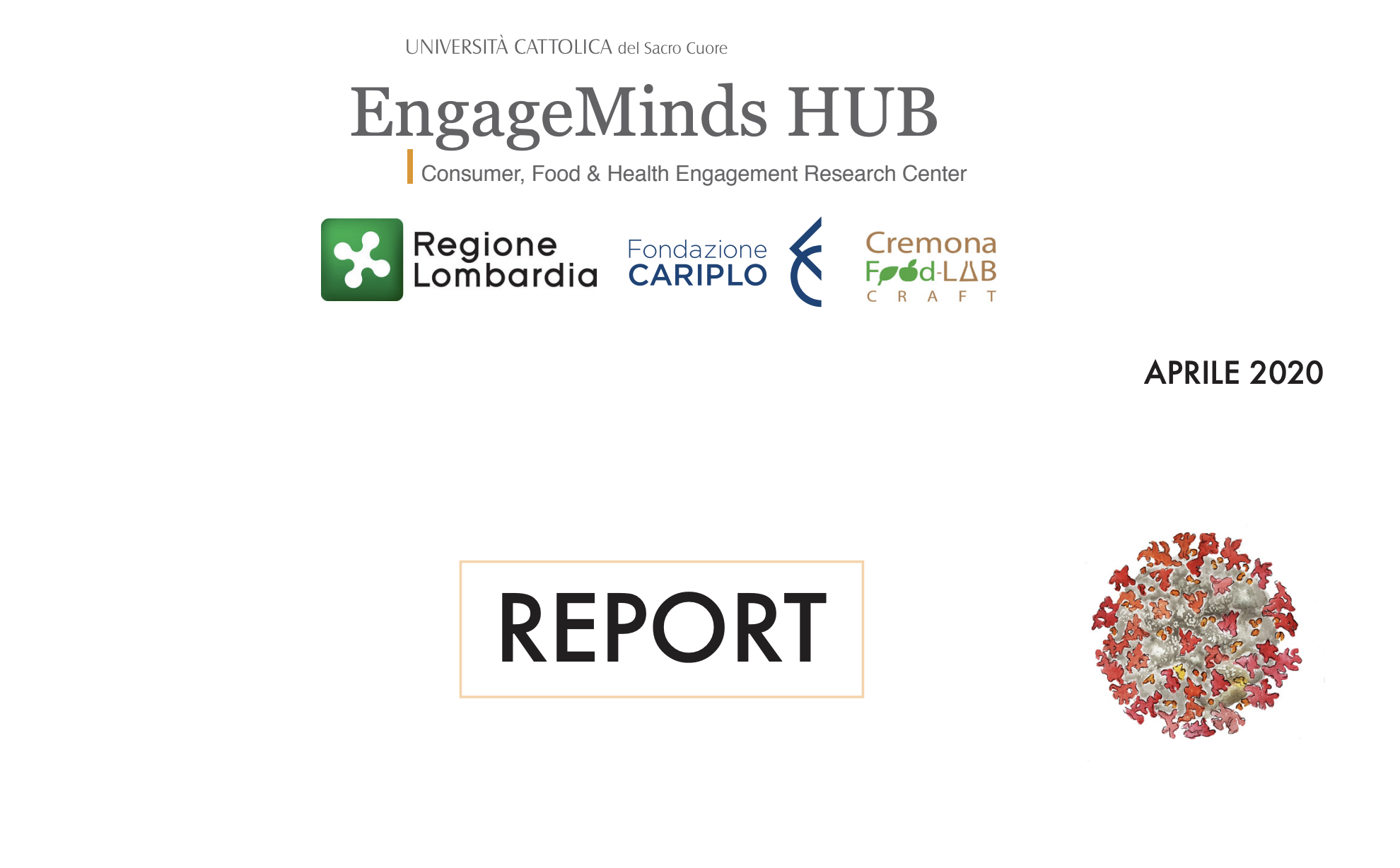Behavioral Covid-19 research in Italy

The Milan-based consumer and health research center EngageMinds HUB of the Università Cattolica has done some timely research on how Covid-19 has influenced the behavior of Italians.
The reports are all in Italian, so you should use a translation engine if you want to read them in full. Meanwhile here is a summary.
COVID-19 and food: opinions and behaviors of Italians
July 2020
24% of Italians feel at risk of contracting COVID-19 due to possible contamination of food products. The fear that food may be a possible vehicle of the virus is more pronounced among those living in the South and Islands (30%) and among those with higher levels of education (35%).
The majority of Italians (60%) believe that food can play an important role in strengthening immune defences to prevent the risk of COVID-19 infection.
However, in the face of this majority, there is still a substantial group of the population (40%) that “does not know” or “does not agree”
The in-depth study on food orientations in the COVID-19 epoch was undertaken as part of a wider research, conducted in the period 12-18 May 2020 (at the beginning of phase 2) on a sample of 1,004 cases representative of the Italian population by gender, age, geographical area and employment. The survey was carried out using CAWI (Computer Assisted Web Interview) methodology.
The orientation of Italians towards possibile vaccination against COVID-19: between propensity, doubts and concerns
June 2020
The majority of respondents (59%) of the representative 1,004 participants, interviewed (with the CAWI technique) in the period 12-18 May 2020, stated to varying degrees that they would be willing to get vaccinated if a COVID-19 vaccine was available.
But a large minority of Italians is either uncertain (26%) or even negative (15%) towards this perspective.
Very relevant on the orientation to vaccination against COVID-19 appears the impact of some personal / psychological characteristics of respondents related to the issue of responsibility: “personal responsibility” (perceiving themselves personally involved in the prevention of contagion) and “social responsibility” (perceiving preventive behavior as an act of social duty). A clearer perception of “personal responsibility” and – even more so – of “social responsibility” increasess the acceptance of the vaccination hypothesis.
Phase 2 of COVID-19: concerns and consumer behaviors
June 2020
The research was conducted as a longitudinal study with 2 independent wave data collection on a total sample of 1971 cases: the first 967 cases were collected from 27 February to 5 March 2020 (first days of emergency in Italy); the second 1004 cases from 12 to 18 May 2020 (beginning of the reopening phase in Italy).
Compared to the first survey carried out at the beginning of the epidemic, the level of concern for COVID-19 has visibly increased in the population from a score of 6 to 7.5 on a scale of 1 to 10.
This increase does not seem to be based on a greater perception of the risk of contagion, which is substantially stable compared to phase 1, but calls into question other reasons, primarily of an economic nature.
In fact, almost 2 Italians out of 3 (59%) feel the economic situation of their family “quite or very at risk” because of the COVID-19 epidemic.
The Coronavirus epidemic and consumer perceptions: from psychosis to engagement
April 2020
With the appearance of COVID-19, only 16% of Italians have developed a good level of engagement (“balance”) while a quarter of the population (23%) is in a state of low engagement (“alert”).
Those who are more scared and on “alert” than the COVID-19 are mainly women, young adults, the uneducated and the unemployed.
One third of the population (32%) are very frightened by the Coronavirus emergency. This percentage doubles (70%) if we consider those on “alert,” while those in position of “balance” seem decidedly more capable of handling negative emotions. Therefore, it seems that the level of engagement intervenes in modulating the attitude of fear towards the health emergency.
The research was set up as a cross-sectional observational study. The data were collected in the week of 27 Feb – 4 March 2020 by means of an online questionnaire, administered in CAWI (Computer Assisted Web Interviewing) mode to a panel of 1000 participants who are representative of the Italian adult population (aged 18 and over) for the main socio-demographic parameters (gender, age, occupation, geographical area).
EngageMinds HUB is the first Italian multidisciplinary research center aimed at promoting and implementing scientific activities – inspired by the principles of consumer psychology – related to the issue of engagement in health behaviors (es. primary and secondary prevention, health promotion, management of health care) and to the study of people’s engagement in food choices and habits.
The activities of EngageMinds HUB are carried out with the collaboration among professors, researchers and qualified experts from different disciplinary sectors (psychology; agricultural, food and environmental sciences; economics; medicine; law; sociology; banking sciences) at national and international level with a view to foster transdisciplinarity and cross-cultural comparison.



